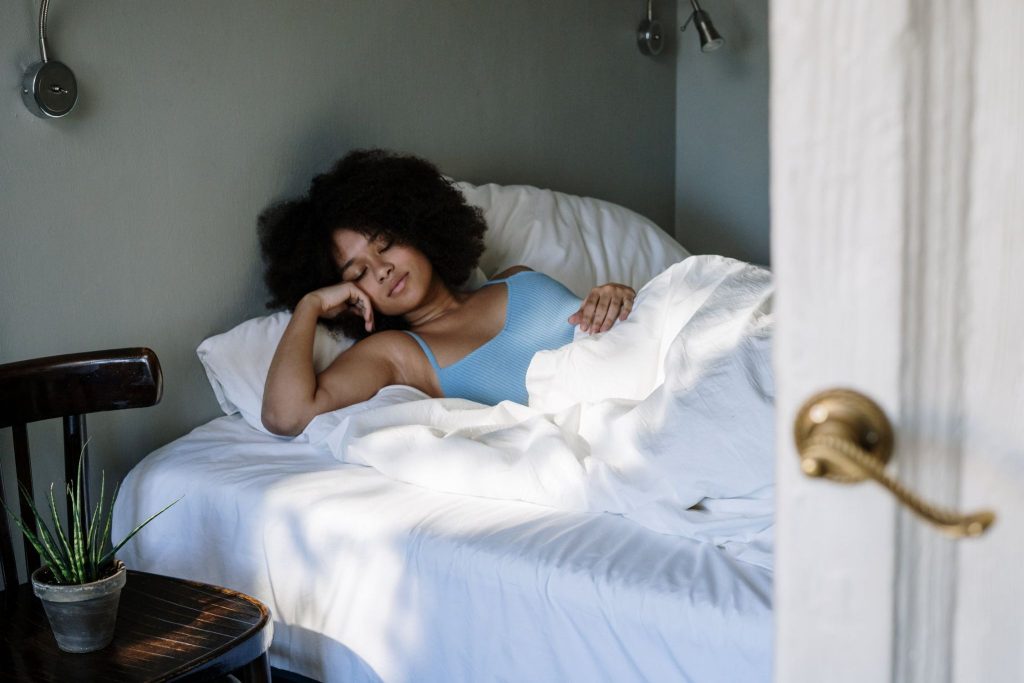
For some, though, a lack of sleep might come from something much more external. Do you live in a busy city and you’re constantly distracted by car horns and streetlights? Is your room too hot and you can’t seem to get comfortable? Maybe your bed itself just isn’t right for you.
There are countless situations you could probably think of. The point is, your environment can have a big impact on your sleep. If you find yourself tossing and turning or waking up exhausted, it could be time to look at your surroundings and the atmosphere as you’re trying to go to bed.
With that in mind, let’s take a look at some of the ways your daily environment and even your choices could be impacting your sleep quality. When you have a better understanding of how the two are related, you can make positive changes for a better night’s rest.
The Damage of Your Daily Routine
When you first think about the environment surrounding you while you try to sleep, you might consider rearranging your bedroom or making some changes to the bed itself. While those factors could be important (and we’ll touch more on them later), what you surround yourself with on a daily basis could also be playing a part in your sleep troubles.
Think about the environment you’re in every day. Now that more people are working remotely, you might find yourself with a home office space that is actually in your bedroom. Maybe you don’t even have an office at all, and you do your work in bed or on your couch. Unfortunately, that can cause your brain to associate those spaces with “awake” time, rather than signaling that it’s time to sleep.
Setting up a separate office space away from your bedroom or wherever you sleep will help your mind to stay on track and keep your circadian rhythms in line. If you live in a particularly small house or apartment, this task might prove a little more difficult than those who have extra rooms to spare — so you might have to get creative. Consider office spaces that are “collapsable,” in the way they can be moved out of the way when you’re finished, or even unique options like working outside on the patio or in the backyard, weather permitting.
Light also has a powerful effect on your sleep-wake cycle. It’s important to make sure you’re getting enough of it during the day – and at the right times. Try to spend time outside at least 30-60 minutes every day. It’s especially helpful if you have an office job or you’re otherwise indoors most of the time. Not only will it balance your circadian rhythms but it can improve your mood. If you spend time exercising outside, it can also improve your sleep at night.
Think about other factors of your routine that could be damaging your chances of a good night’s sleep. They could be small things that add up quickly, including:
Watching television in your bedroom
Spending time on your phone before bed
Going to sleep at different times each night
Eating before bed
Drinking caffeine in the afternoon
Your environment and your habits throughout the day can have more of an impact than you realize. If you’re truly struggling to sleep at night, consider making some changes during the day.
Uncontrollable Environmental Factors
It’s nearly impossible to go a day without hearing about climate change, global warming, or carbon emissions impacting the environment. While there are plenty of risks involved with climate change, did you know it could also be affecting your sleep?
Some studies have shown that climate change could play a part in your overall sleep health. The simple explanation is that the planet is getting warmer, and when you’re too warm while sleeping, your body is more prone to wake up. It’s a disturbance, just like a loud noise or other sudden distraction. While it might not seem like a big deal right now, the global population could lose 11 hours of sleep every year by the end of the century if current climate trends continue. Needless to say, it’s important for individuals and cities alike to reduce climate change through efforts that include:
Zero-waste zones
Sustainable transportation
Reducing CO2 emissions
Designing green buildings
Urban planning
In addition to climate change, noise and light pollution can feel like uncontrollable external factors, too. Unfortunately, depending on where you live, it can feel impossible to get away from the noises of the night. You might also be struggling because you have a large streetlight shining in through your window.
While those things can’t necessarily be stopped, there are things you can change within your sleep space to create a more exemplary environment, no matter where you live or what external factors are keeping you up.
Setting Up the Perfect Sleep Space
Your bedroom should be the only place you sleep at night, and it should just be used for sleeping. There are so many environmental factors that can make a difference in your quality of sleep, but when you have a space specifically dedicated to it, you’ll have more control over those factors.
To create the perfect home environment for sleep, there are a few specific things to keep in mind. Most importantly, you’ll want to focus on temperature, comfort, lighting, and distractions. Your sleep space should be a place you can come to relax. When it’s designed solely for sleeping, your mind and body will associate it with rest, and you’ll have an easier time falling asleep at night.
If you’re struggling with some of the external factors we talked about earlier, your sleep area can compensate for them. Dealing with a lot of excess noise or light? Try light-blocking curtains. Most of the time, they’re so thick that they can also help to block out some of the noise. You can also wear earplugs to bed, as long as they don’t bother you or cause any discomfort.
Your room should also be as organized as possible and free from clutter. Even if it’s dark and you’re trying to sleep, being surrounded by clutter can cause your mind to go into overdrive, making it harder to get the rest you need.
Finally, now that you know temperature can play a part in how well you sleep, adjust the temperature in your room to anywhere between 54 degrees-74 degrees. Anything lower or higher could be uncomfortable and cause you to wake up throughout the night.
If you have a specific condition keeping you from getting the sleep you need, the best thing you can do is talk to a medical professional for help. Sleep is crucial, and getting to the bottom of your struggles is important. But, if you’re worried it’s your environment that could be causing your issues, don’t hesitate to make changes in your life and in your sleep space to create a better, more relaxing environment for yourself. You need it, and you deserve it.
If your sleep is a chronic issue that has not improved after environment or habit changes, you may have sleep apnea. Speak to your doctor to see if a sleep study is right for you, or call Alaska Sleep Clinic today @ 907-420-0540.












